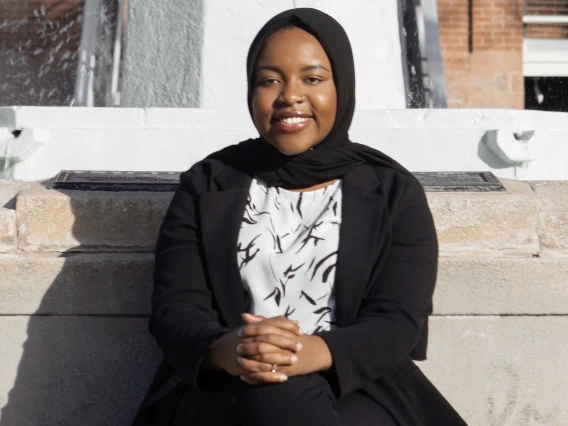
As a nursing major, Maryan Hassan knows her career path lies in health care.
But it’s her Africana Studies minor that’s helping to define that career path and how her goals connect to the larger world. Eventually, Hassan would like to open her own practice as a nurse practitioner, focusing on underserved populations, like Black communities, immigrants and others that have difficulty accessing or affording the care they deserve.
“I want to create a practice that prioritizes those needs,” she says. “Activism is a huge part of who I am and I hope I can continue the work of dismantling repressive systems in health care.”
Hassan, Administrative Vice President of the Associated Students of the University of Arizona, says she entered college certain that she’d pursue nursing. But after enrolling in Introduction to African American Literature, with Associate Professor Bryan Carter, to fulfill a general education requirement, she added another focus.
“I liked it so much that I spoke to Dr. Carter in his office and I left his room with a minor in Africana Studies, literally the third week of school,” she says. “I didn’t expect that was going to be a path I’d take. But that class was so fascinating that I had to keep going.”
Ever since, Hassan says she’s come to understand how the various themes and ideas discussed in Africana Studies are part of a bigger picture that impacts all of us.
“The thing that I really enjoy about the Africana Studies minor, and Humanities in general, is the fact that it ties together and interconnects with everything,” she says. “All of the courses I’m taking related to Africana Studies are diverse, not only theoretical, but also practical. I’m constantly challenging my ideas about race in America, in the Caribbean, in Africa, in Europe and how they are all interconnected.”
For just one example about how Africana Studies has informed her nursing education, Hassan says that understanding how the stereotypes about people from the African diaspora that derive from racism and anti-Blackness carry over to the fields of medicine and public health helps her to analyze the causes of disparity in healthcare.
“All of the main topics that are discussed connect with various parts of my life, not just my nursing major, but my life and how I navigate the University of Arizona,” she says. “It’s really interesting to contribute to the conversation.”
The biggest component Africana Studies has contributed to her role as an elected student leader is the emphasis on being open-minded to different ideas and opinions and levels of learning. Learning about the diaspora of African peoples comes with layers of difficult conversations, with a variety of different perspectives.
“Leadership is about having productive conversations,” she says. “Being open-minded, being compassionate, being willing to have conversations and understand that different perspectives are part of the learning process is very important. Knowing that my experiences are completely different from other and knowing when to accept and challenge those differences in others is very important.”
Twice in her Africana Studies program, Hassan joined the Carter’s study abroad class to Paris during Spring Break. In 2019, it was her first trip out of the country, and having studied the influence of African Americans on the culture of Paris, getting to see the lessons come to life was deeply impactful, she says.
“One of the things overall that stands out to me is the amount of energy the professors put into making sure everything the students are learning is applicable to their lives,” she says. “It’s not just reading history, but it’s watching contemporary films and being able to relate the themes about what’s happening currently to what’s happened historically. That’s what sets them apart from any other department on campus, they try to challenge students and their perceptions.”

